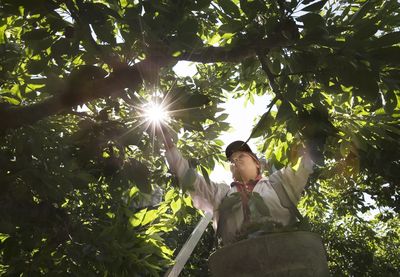Retaliatory tariffs hit Washington, Oregon fruit crops
Mexico is largest market for Northwest pears

YAKIMA – Washington state apples escaped a tariff imposed by Mexico in retaliation for a halt to Mexican trucks entering the United States, but other Northwest crops weren’t so lucky.
A lengthy list of product are subject to tariffs as of Thursday, including pears, cherries, apricots, Christmas trees and frozen potatoes.
The full list of products represents $2.4 billion in trade nationally.
Fresh pears, the only affected crop being exported to Mexico at this time of year, will see an increase of up to $4 per box, industry officials said. The current average per-box price is $18.
Mexico is a $40 million market for Washington and Oregon growers and is the Northwest’s largest export market for Anjou pears.
Washington and Oregon have shipped 1.36 million boxes so far this year on the heels of almost 2 million boxes last year, according to the Yakima Valley Growers-Shippers Association.
The average Northwest pear crop exceeds 13 million boxes.
“I think, without a doubt, this will hurt the pear guys,” said Mark Powers, vice president of the Northwest Horticultural Council in Yakima. The council represents the tree-fruit industry on trade and other issues.
Jeff Correa, international marketing manager for Pear Bureau Northwest, the promotional group for growers in the region, said the impact will depend on how long the tariff lasts.
“If the feeling is this is going to be long-term, I don’t think it will shut off volume. It will reduce it,” Correa said. “There will still be room to sell fruit. The market will need to adjust.”
Cherries and apricots are out of season and won’t be affected unless the tariff stretches into the early summer. The Northwest shipped 50,000 boxes of cherries to Mexico last year out of a total crop of 8.9 million boxes.
Mexico imposed the tariff after the United States ended a pilot program that allowed some Mexican trucks to transport goods in the United States.
Mexican officials described the decision as protectionist and a violation of the North American Free Trade Agreement.